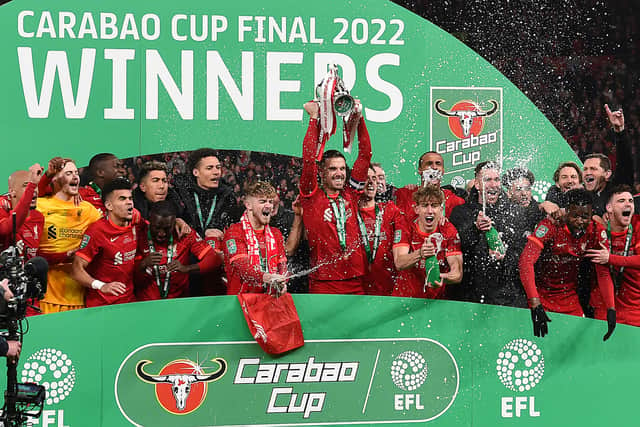Neuro11: How a team of scientists helped propel Liverpool to glory
and live on Freeview channel 276
When Liverpool lifted the Carabao Cup on Sunday - beating Chelsea 11-10 on penalties after 120 minutes failed to separate the sides - Jurgen Klopp gave a thankful nod to a team of scientists and their company: Neuro11.
The team, Klopp said, has been working with Liverpool since their training camp in Evian last summer and - as the name suggests - uses neuroscience to gather data on individual players’ optimal state by monitoring brain activity.
Advertisement
Hide AdAdvertisement
Hide AdIt started with the club’s main set-piece takers, namely Trent Alexander-Arnold and Mohamed Salah, but has since expanded to every member of Klopp’s team. The boffins had even mapped out the entirety of the 11-man order for Sunday’s shootout, before some preferred options were substituted.


The companies co-founders, Dr Niklas Hausler and Patrick Hantschke, were at Wembley to watch their work pay off in the most perfect way imaginable as every penalty was scored and they were also present at Anfield to watch the Reds hit Leeds United for six.
And they were everpresent at the clubs training ground throughout the build up to the final, monitoring each player’s mental state during penalties, as well as during other set-pieces.
Speaking after the final, Klopp told LFCTV: “Somehow I had a feeling we deserved it, [goalkeeper] Caoimhin Kelleher especially deserved it, and you have to say that we have Neuro11.
Advertisement
Hide AdAdvertisement
Hide Ad“We worked with them in the pre-season, and they were training set pieces with the boys in the last few weeks. Each player went through a proper drill, psychological, to do with penalties, corners and free-kicks.”
And the Reds manager expanded on the training method more recently: “Incredible impact. All the players are really excited about it and it’s about bringing specific players before a set piece in the right mindset by doing the stuff we do on the pitch.
“Everything gets measured, there are neuroscientists and it’s incredibly interesting and incredibly important to us.
“It’s a very interesting new chapter for us because it’s not only penalties, although in the last week it was a lot about penalties because of the upcoming final. It’s about free-kicks, all kind of set-pieces as well.
Advertisement
Hide AdAdvertisement
Hide Ad“Penalties are the most obvious thing [they work on], but it’s about all set-pieces: corners, free-kicks, direct free-kicks, crosses and all these kind of things. Whoever comes into these situations has extra sessions with the Neuro11 guys.”
In the zone
The Neuro11 website describes itself as ‘state-of-the-art mental strength training for elite athletes’.
In practice, the neuroscientists strap electrodes around a players head and monitor their electrical activity in the brain while they are performing a task - taking a penalty, free-kick or corner - while gathering data based on the player’s mental state.
The data can determine when and for how long a player is in their optimal state - i.e. ‘in the zone’ - and what it is they’re doing to stay there.
Advertisement
Hide AdAdvertisement
Hide AdIn an interview with The Athletic, Dr. Hausler explained in more detail.
“When you are able to perform at your best, you let your motor output run automatically,” Hausler said.
“You don’t have to think about it, it’s just happening. What we do with a player is we decipher with them and figure out what parts of this process help him or her to get into that brain state.
“We try to fine-tune it so in the end, the player has a mental tool so it doesn’t matter what the situation is, you know what you should focus on and you don’t get disorientated.
Advertisement
Hide AdAdvertisement
Hide Ad“You can’t re-create a real high-pressure situation but you can give a player the right tools to be prepared for that. We provide these tools so when a penalty comes up you are able to deal with all the distractions around you and you know exactly what to do to score that goal.”
What it means is that every player understands what actions they need to take and where they need to target their focus in order to achieve peak mental performance - anything from deep breathing to focusing on either the ball or the goal.
Does it actually work?
The evidence from Liverpool’s set-piece performance this season would say, overwhelmingly, that this unusual method works.
Every single player scored their penalty in the Carabao Cup final - including goalkeeper Caoimhin Kelleher - and not one would have counted themselves as lucky to do so.
Advertisement
Hide AdAdvertisement
Hide AdEighteen-year-old Harvey Elliot finished with aplomb, Virgil van Dijk smashed into the corner and Fabinho even had the audacity to pull off a Panenka as the second taker.
And the effect has been clear all season. Klopp’s side have scored 15 goals from set pieces in the Premier League this season plus another five in the Champions League - last season they managed 13 in all competitions.
Vital goals have come from set-pieces: Roberto Firmino’s header at Inter Milan and Fabinho’s eventual winner at Burnley are recent examples.
And they remain in contention for the league, FA Cup and the Champions League after Sunday’s Carabao Cup win.
Advertisement
Hide AdAdvertisement
Hide AdHow much of this season’s success - how much even Sunday’s success - is directly down to the work of Neuro11 is impossible to determine, but it can be no coincidence that their involvement at the club has coincided with what could well be their best season under Klopp.
Their work has been described by many as the next big technological innovation in the world of football and the fine margins that they can gain from measuring this kind of activity can make the difference.
Only time will tell exactly how far it can take them.